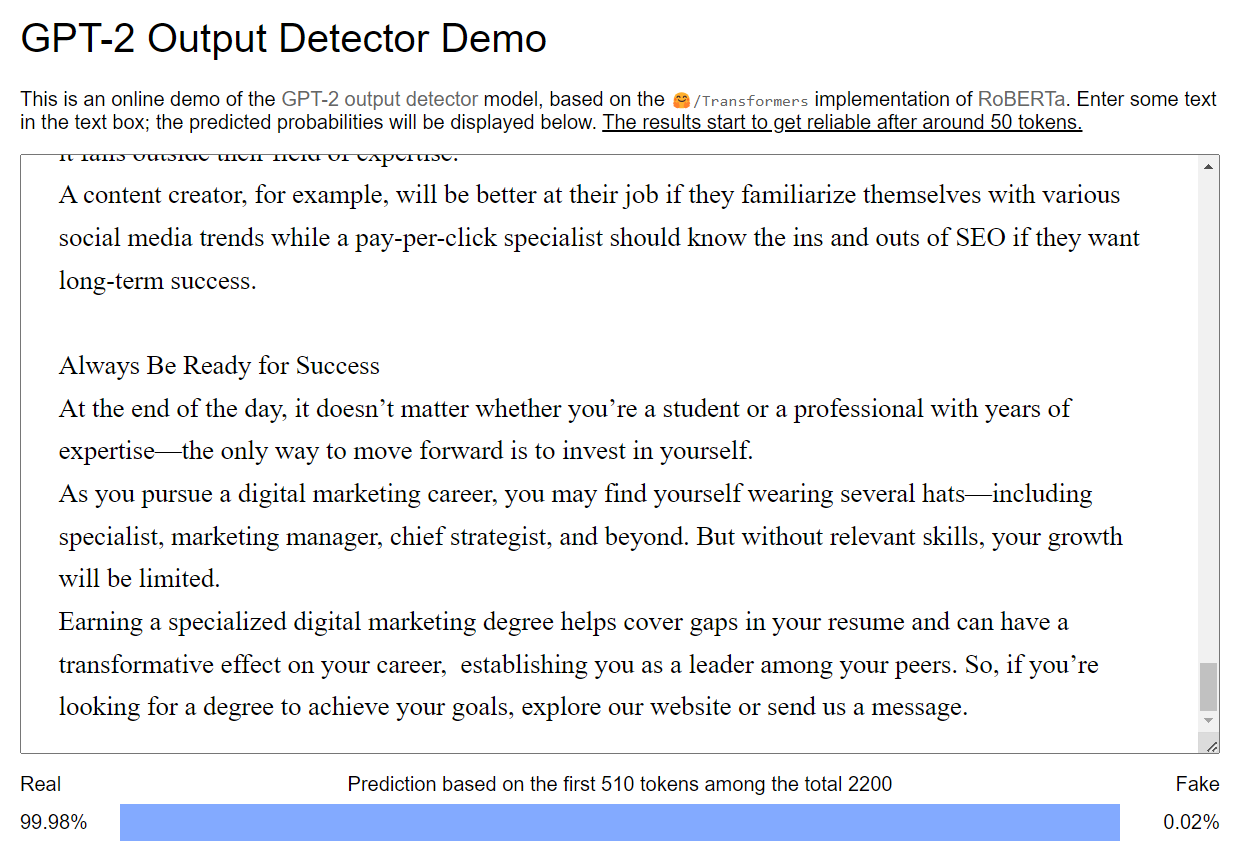The US urgently needs more digital marketing professionals. Statista research suggests that by 2025, digital advertising revenue will cross the $700 billion mark, with the US retaining its role as the biggest market for budding professionals.
Combined with the ever-changing digital landscape, the continuous demand for digital marketers has effectively ensured that the profession remains lucrative.
Still, a few questions remain: How do professionals enter such a broad and diverse field? What specializations and certifications do you need to succeed? How do you ensure that your qualifications keep up with this dynamic profession?
This article shares the typical career trajectory of a digital marketer, giving readers much-needed insights.
Table of Contents
What Are the Roles and Responsibilities of a Digital Marketer?
A digital marketing expert oversees the conception, execution, and monitoring of a marketing campaign from start to finish. These professionals work on strict deadlines and tight budgets to produce measurable results for their clients.
A digital marketer may be employed by an agency, or an in-house team. Marketers can also offer their services to various brands and companies as freelancers.
The specific tasks they carry out vary based on experience. For example, fresh-out-of-college interns may be expected to execute more menial jobs, such as sending out emails or scheduling posts while chief marketing officers must oversee the progress of an entire campaign, and ensure it goes without a hitch.
What exactly are these tasks? Well, that’s where it gets a little more complicated.
While the general overarching mission of online marketing remains the same—using digital channels to promote a client’s brands, products, or services—careers can vastly differ depending on one’s area of expertise. And given the number of digital channels available today, several specializations can be considered.
Let’s look at some of the prominent roles and responsibilities of a digital marketer, and the outcomes expected from beginner to expert.
Search Engine Optimization
SEO or search engine optimization is a vital digital marketing tool that can be very lucrative when perfected.
It refers to a set of practices that enhance a website’s organic traffic, ensuring it ranks higher on a search engine results page (SERP). It improves brand visibility, enhances audience engagement, and leads to more conversions.
SEO professionals must master several techniques, ranging from keyword research and backlink building to more technical practices that enhance user experience, such as improving website responsiveness, loading speed, and accessibility.
The Three Stages of SEO Expertise
Beginner: To start your career as an SEO expert, you must develop a basic understanding of how websites work, how to research the keywords audiences are using, and how search engines decide what content to promote.
Mid-Level: Once the basics are out of the way, you will implement SEO practices across campaigns and platforms. You will also be expected to familiarize yourself with more advanced techniques such as formulating topic clusters, building links with paid ads, and utilizing structured data to more effectively communicate with a search engine.
Expert: To be considered an expert, you must have a strong grasp of all SEO practices whether on-page, technical, or otherwise. You will also masterfully streamline various organic and paid marketing tactics to enhance customer engagement and generate conversions.
Content Creator
Content creators are experts at telling brand stories and highlighting the unique selling propositions (USPs) and benefits of products. As a content specialist, you’ll thus be expected to consistently write succinct copy or present multimedia stories that are relevant, engaging, and informative to target audiences.
This content could come in the form of a social media post, a blog, an email, or more. The format isn’t as important. What’s most crucial is the end goal—giving a brand a personality and a voice.
Content creators are also responsible for addressing common queries, introducing new products, and enhancing brand visibility and credibility.
The Three Stages of Content Creation
Beginner: As an intern, you’ll have to familiarize yourself with the basics of content writing, including how to use language to persuade audiences into taking action. Content creators must also be familiar with basic SEO practices, how various social media platforms work, and be tuned into all the latest social media trends.
Mid-Level: After a few years, content professionals develop more unique strategies, including innovative multimedia content, to differentiate a brand from its competitors. You will also be expected to leverage modern tools to monitor and analyze campaigns, make improvements, and generate more leads.
Expert: Once at the top, you may not be expected to write copy or create engaging posts on your own. Instead, you will use your experience to craft a cohesive brand voice that dictates content and marketing communications across platforms.
Social Media Manager
Since more than half the world uses at least one form of social media, this channel is crucial for digital marketing. As a social media manager, you’re responsible for scheduling and posting content as well as designing and executing strategies that target specific audiences and enhance conversions.
For this reason, the best social media managers deeply understand each platform, its users, and the latest trends shaping conversations and generating buzz online.
Within the last few decades, we’ve witnessed the transformation of the profession firsthand. Initially, many brands were content working with 20-somethings to appeal to younger audiences on platforms like Instagram. But today, massive teams manage the social media profiles of leading companies, brands, and service providers.
The Three Stages of Social Media Expertise
Beginner: Beginners have a firm understanding of various social media platforms and trends. They manage profiles, schedule posts, engage with the community, and analyze campaigns.
Mid-Level: To level up, a social media manager must devote themselves to crafting more engaging campaigns, building a social media voice, partnering with influencers, and handling online negativity with sensitivity.
Expert: As an expert, you’re likely an established social media leader in your own right, showcasing expertise in platform-specific content and user behavior to shape innovative strategies. You also have solid social media knowledge that your team can emulate.
Pay-Per-Click Specialist
A pay-per-click specialist has a keen understanding of keywords, target demographics, and human psychology to convince audiences to click on an ad.
Despite working with sponsored advertisements, a pay-per-click specialist (PPC) doesn’t just throw money at the problem. Instead, they develop and design advertisements from scratch, stay up to date on the latest trends, and use advanced tactics to analyze and tweak campaigns, maximizing the return on investment (ROI).
A PPC specialist may also design landing pages for ads. These pages must grab attention and encourage action in mere seconds. Optimizing the process often requires several rounds of trial and error, streamlined communication between teams, and a strong understanding of various digital marketing aspects.
The Three Stages of PPC Expertise
Beginner: As an entry-level PPC professional, you’ll carry out basic research, including evaluating what brings customers to a site and how competitors are faring. Based on this, you can start crafting ads that hit the mark.
Mid-Level: As you progress, you’ll begin assessing the effectiveness of a campaign based on various metrics, including conversions and ROI. Your data-driven approach will guide future strategies and maximize budgets. Senior PPC experts are also well-versed in various SEO practices.
Expert: Once a PPC expert takes on a more managerial role, they will likely direct a team of SEO and SEM (search engine marketing) experts to craft more effective campaigns. They also build relationships with clients, introduce new advertising strategies, and manage sponsored posts across platforms.
How To Get Ahead as a Digital Marketer
While it’s useful to understand the career trajectory of the average digital marketer, the demarcation above isn’t set in stone. Often, roles blend into one another and several of these responsibilities could fall on your shoulders. Similarly, you may have noticed that as you rise in seniority, you’re expected to be a master of all trades regardless of who you work for.
Here are three ways you can adapt and grow in your marketing career:
Pursue Degrees and Certification Programs
For a digital marketer, the learning never stops. The internet is a vast and dynamic space, offering brands and companies newer ways to market their goods and services. In this landscape, the only way up is through constant self-improvement.
While a degree isn’t a must to conquer the world of digital marketing, relevant expertise in communication, business, or liberal arts can help you achieve success.
You can also consider several specialized degrees and programs to make your CV more attractive. These range from broader marketing Master’s degrees to boot camps in viral marketing and programs focusing on niche subjects such as the science of analytics. These courses are flexible, easy to find, and help hone skills at any age.
Stay on Top of the Trends
With disruptive technologies like generative AI, machine learning, and virtual and augmented reality, the role of a digital marketer is set to transform significantly.
Social media platforms are changing too. The sudden rise of TikTok and Instagram’s relentless promotion of Reels indicates that short-form video is the trend of the day.
The marketing trends of 2024 are already reflecting this rapid shift, with roles like content creator and SEO professionals making way for more all-encompassing “experience marketing experts,” or highly specific “AI marketing managers.”
Diversify Your Skills
Large companies may hire specialized professionals to handle various aspects of digital marketing. But small businesses, agencies, and brands don’t have this luxury. Whichever the case, every professional benefits from having a general understanding of all the tools and practices used in a campaign even if it falls outside their field of expertise.
A content creator, for example, will be better at their job if they familiarize themselves with various social media trends while a pay-per-click specialist should know the ins and outs of SEO if they want long-term success.
Always Be Ready for Success
At the end of the day, it doesn’t matter whether you’re a student or a professional with years of expertise—the only way to move forward is to invest in yourself.
As you pursue a digital marketing career, you may find yourself wearing several hats—including specialist, marketing manager, chief strategist, and beyond. But without relevant skills, your growth will be limited.
Earning a specialized digital marketing degree helps cover gaps in your resume and can have a transformative effect on your career, establishing you as a leader among your peers. So, if you’re looking for a degree to achieve your goals, explore our website or send us a message.
References:
- https://online.wvu.edu/blog/communications/is-digital-marketing-a-good-career
- https://marketingcommunications.wvu.edu/professional-development/marketing-communications-today/marketing-communications-today-blog/2023/12/01/marketing-trends-for-2024
- https://www.equinetacademy.com/digital-marketing-career-progression/
- https://uk.indeed.com/career-advice/finding-a-job/digital-marketing-career-path
- https://uk.indeed.com/career-advice/finding-a-job/how-to-become-digital-marketer
- https://techbootcamps.utexas.edu/blog/digital-marketing-career-path/
- https://clockworktalent.com/digital-marketing-career-paths-explained/
- https://www.wrike.com/digital-marketing-guide/digital-marketing-roles-responsibilities/
- https://www.aumcore.com/blog/future-digital-marketing-trends/
- https://uwex.wisconsin.edu/stories-news/digital-marketing-career-outlook/
- https://www.coursera.org/resources/job-leveling-matrix-for-digital-marketing-career-pathways
- https://herd.digital/digital-marketing/digital-marketing-career-path-guide/
- https://www.semrush.com/blog/seo-vs-sem/
- https://www.semrush.com/blog/seo-specialist/
- https://digitalmarketinginstitute.com/blog/what-is-seo-and-why-is-it-important
- https://brainstation.io/career-guides/is-seo-hard-to-learn
- https://www.semrush.com/blog/advanced-seo/
- https://www.indeed.com/career-advice/finding-a-job/how-to-become-ppc-consultant
- https://digitalmarketinginstitute.com/blog/what-does-a-ppc-specialist-do
- https://www.webfx.com/ppc/learn/ppc-experts/
Hyperlinks:
- https://www.statista.com/topics/1176/online-advertising/#topicOverview
- https://www.semrush.com/blog/advanced-seo/
- https://marketingcommunications.wvu.edu/professional-development/marketing-communications-today/marketing-communications-today-blog/2023/12/01/marketing-trends-for-2024

